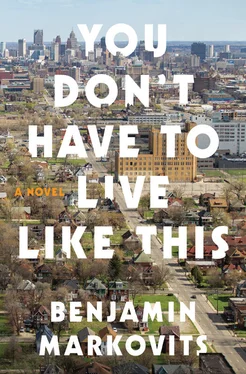Robert worried that no one would bite, but in fact Beatrice kept having to add capacity to the server. At its peak, Starting-from-Scratch-in-America received a hundred thousand fresh hits a day, from all around the world. Mayor Bloomberg in New York had just suggested opening up Detroit to international immigration. Robert had his lawyers talking to the ICE as well. A bid was “full” when every house and plot in a particular neighborhood had been spoken for by the members of a group. This is when it came to us in committee.
In other words, we sat around all day looking at Facebook, deciding who would get to join our village. Like a bunch of assholes, as Tony kept reminding us. There were Beatrice and Tony, Clay Greene and me, Robert himself sometimes, Johnny Mkieze and Bill Russo. Johnny was living in Grosse Pointe, three blocks away from his childhood home, having followed his father into a job at GM. Bill was just then running for reelection to the Michigan House of Representatives. His district happened to include the section of east Detroit that his old college buddy had been buying up. Robert gave a lot of money to the campaign. It was all very cozy.
But Robert also brought in a team of consultants, specialists in urban renewal, and the truth is, they called most of the shots. I remember a black woman named Barbara — Barbara Stamford from Stanford, this is how she introduced herself, one of these women who jogs eight miles a day and lives off cottage cheese. She wore cheerful bright-rimmed Prada glasses. I asked her once what got her interested in Detroit, and she said her work at Stanford was on “optimal inefficiencies.” Efficient economies need to adapt instantaneously to changes in the market, in technology, but there’s a measurable human cost to all this. People don’t want to adapt all the time, they want to not adapt. What economists do is put a value on everything; you can calculate the cost of adaptation, too, and what she liked to think about was the optimal rate of change. Not too slow, not too fast. Detroit was like a poster child for getting it wrong. But I could tell she was talking down to me.
Once or twice a week we met up in the big dining room, with printouts and laptops cluttering the table. Sometimes I came straight from the house, with the leathery smell of gardening gloves on my hands and paint scabs spotting my hair and pants. The contrast made a deep impression on me, and maybe explains why from the beginning of this whole business, I felt like an outsider.
Meanwhile, the weather improved. Baton Rouge doesn’t make much of spring, but over the Detroit sidewalks trees bloomed and lawns, pushing off the snow, broke out in daffodils. On Robert’s block gardeners in dirty overalls produced expensive and colorful displays of hydrangea, lilac and rose. But even in the overgrown yards of burned-down houses bindweed and dandelions blossomed.
Robert and I went running sometimes on Belle Isle Park, along the river, where the wind was cold but not bitter. A skyline view of Detroit, as clean as you like, stood up straight-backed on the far shore. There were cold blue days busy with clouds and hot white afternoons and gray mornings where the rain came down as hard as if it fell off a roof. But Robert didn’t care what the weather was. He liked to get out of the house and ask me questions about what was going on inside it. Also, he thought I spent too much time with Tony Carnesecca. In his hard-to-read conscientious way, which was partly ironic, he said, “Tony’s a bad influence. Has he given you any books to read yet? This is the kind of thing he does.”
“Yes.”
“What?”
“You know, more than one. Cultural Amnesia , by a guy called Clive James. The Confessions of St. Augustine .”
This was true. Tony wanted to raise his kid a Catholic, like he was raised. He planned to give his son everything he himself had as a boy, including some of the misery. Both my parents are Catholic, though my dad gave it up in college, without a second thought. Like you give up mowing the lawn when you move out of home. And my mom found it hard to persist with after they started going out, which she sometimes reproached him for. Tony took her side and kept bugging me to show my face some Sunday morning at St. Barnabas, one of those bungalow-type churches with a sloped roof and yellow-brick front. He pointed it out to me once, from the car. He promised to pay for my pancake breakfast if I went, at the IHOP in Roseville, which is where he always took his wife and kid. But I’d resisted.
Maybe Robert had some Scot Calvinist beef against all this, or maybe he just felt left out. Tony and I had developed a manner, as boy roommates do in college, which was quick, abusive, satisfying and hard to butt into, for an outsider. When he didn’t feel like writing he picked me up in his Buick LeSabre and we drove around. Sometimes we drove back to his house in Eastpointe, where I met his wife. She was four or five inches taller than Tony and an unusually beautiful and confident woman. Her dark hair and cheerful healthy color reminded me of the old Irish Spring soap commercials. Tony took a lot of sexual pride in her; he couldn’t help showing her off. Her name was Cris, short for Cristina. Her parents on both sides were Italian American, and she regularly visited her grandfather who owned a bakery in Clarkston and spoke almost no English.
Cris herself used to be a lawyer, for one of the Big Three, which she hated. She gave it up to become a yoga instructor, which is how she met Tony — he had a bad neck. Motherhood for her was like an excuse to abandon all previous adult restraint, and even though her son was three years old, she still comfort-fed him when he asked for it. “I want booby milk,” he said. Sometimes I had to avert my gaze while she picked up this big talky stir-crazy boy and held him on her lap, pulling back one side of her dress to spill a breast in his mouth. His feet almost reached the floor, and dangled. Her skin was the color of panna cotta. I thought Tony was the kind of guy who would mind if I looked. But I liked Cris — she didn’t take him too seriously.
Tony was house-proud, too, and talked up his neighborhood to me, even if he blamed himself for leaving the city. His writer’s block was connected in his mind to comfortable living. He didn’t feel like himself in the suburbs, he felt like somebody else. The trouble was his natural feelings included a high percentage of racial rage and violent fear. Which were useful for work but less helpful to family life. He knew practically everybody on his block. Once, while preparing an omelet lunch for us, he ran out of eggs, so we knocked on a neighbor’s door together — really Tony was just showing off. He couldn’t help boasting about his happy-families kind of setup.
This neighbor was a retired cop whose wife had left him to move in with her parents in Florida. Their three daughters were all grown up and living out east. Her mother had diabetes and her father couldn’t drive or count out pills or shop or cook or change the bedsheets because of forgetfulness issues. The diabetes was what tipped his wife over the edge, but in fact what this guy realized was that their whole marriage for her was just an interruption of her real life. (He told me all this while working his way through a six-pack of Labatts, which he brought over along with the six-pack of eggs when Tony invited him to lunch.) They married instead of going to college. He joined the force.
“I guess we were too young,” he said.
And fifty years later she decided she wanted to spend her last days with these people, her parents, who she preferred to him anyway. He didn’t even blame her particularly but he missed the kids. They never wanted to fly home to Detroit; they preferred Florida.
Читать дальше












